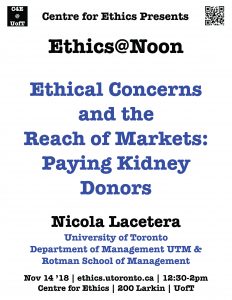
Ethical Concerns and the Reach of Markets: Paying Kidney Donors
Legislation and public policies are often the result of competition and compromise between different views and interests. In several cases, strongly held moral beliefs voiced by societal groups lead lawmakers to prohibit certain transactions or to prevent them from occurring through markets. However, there is limited evidence about the specific nature of the general population’s opposition to using prices in such contentious transactions. We conducted a choice experiment on a representative sample of Americans to examine preferences for payments to kidney donors. We found strong polarization, with many participants in favor or against payments regardless of potential supply gains. However, about 20% of respondents would switch to supporting payments for sufficiently large supply gains. Preferences for compensation have strong moral foundations. Participants especially oppose systems with payments by organ recipients, which they find in conflict with principles of fairness and dignity. We corroborate the interpretation of the findings with the analysis of a costly decision to donate money to a foundation that supports donor compensation.
☛ please register here
 Nicola Lacetera
Nicola Lacetera
University of Toronto
Department of Management UTM &
Rotman School of Management
Wed, Nov 14, 2018
12:30 PM - 02:00 PM
Centre for Ethics, University of Toronto
200 Larkin
